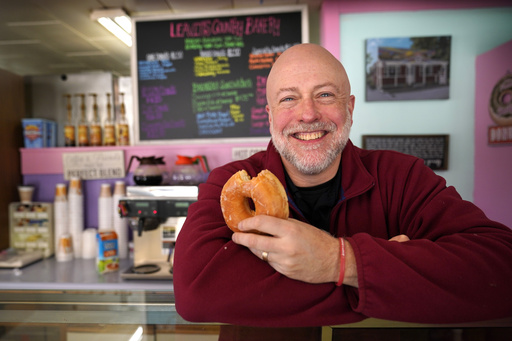Concord, N.H. — A legal battle regarding First Amendment rights is set to unfold as a federal judge in New Hampshire prepares to examine a vibrant mural that depicts sunbeams illuminating a mountain range made of sprinkle-topped chocolate and strawberry doughnuts, blueberry muffins, and cinnamon rolls. The focus of the trial will be whether the town is breaching the free speech rights of the bakery owner displaying this mural above his establishment.
Sean Young, the proprietor of Leavitt’s Country Bakery located in Conway—a picturesque town with a population exceeding 10,000 nestled near the White Mountains—has reported significant interest from the local community concerning the matter. With an influx of visitors comprising skiers, nature enthusiasts, and shoppers, some members of the community have expressed a desire for stringent regulations due to fears of overdevelopment in this tourist destination.
The mural, created by local high school art students and unveiled in June 2022, initially garnered widespread admiration and attracted a steady stream of visitors, including a town zoning officer. However, the zoning board ultimately classified the mural not merely as an artistic endeavor but as a sign, citing its size as a violation of local regulations. Measuring approximately 90 square feet—four times the permissible area under the local sign code—the board ruled that if the artwork did not depict items available for purchase, such as baked goods, it would not be classified as a sign and could remain.
The town’s legal representatives maintain that limiting the dimensions of signage is crucial for maintaining the aesthetic appeal of the community, safeguarding public safety, and ensuring consistent enforcement of regulations. Young has been advised that he must alter or take down the mural. Upon facing potential misdemeanor charges and fines after his appeals were unsuccessful, he initiated legal action against the town in federal court in 2023, asserting that his rights to free speech had been violated.
The Virginia-based Institute for Justice, which is advocating on Young’s behalf, emphasized that government officials should not dictate the artistic expressions of individuals, including business owners. They further claimed that there is no rational basis for asserting that Young’s mural would be any less safe, healthy, or visually appealing if it were to feature flowers rather than pastries.
Young is seeking a symbolic $1 in damages, contending that the town’s definition of a sign is excessively broad and arguing that the town has failed to demonstrate any negative implications should the mural remain. As it stands, the artwork continues to adorn the bakery’s exterior. Despite the town’s assurances that it does not aim to limit personal free speech, the regulations stipulate that reasonable restrictions may be applied to commercial speech.
The town has previously enforced its sign regulations against other businesses, including a 2006 incident where an ice cream parlor’s trash cans, shaped like ice cream cones, were deemed signage; however, the business was granted permission to use them. Additionally, a sporting goods store was compelled to remove window displays featuring mountain bikes and skis after similar determinations by the town.
A temporary halt was placed on Young’s lawsuit earlier in 2023 as local residents deliberated potential changes to the definition of signs that would permit the mural to remain. However, this proposed measure was ultimately rejected for being overly comprehensive. A new ordinance enacted last year mandates that applicants satisfy specific criteria for artwork displayed on public and commercial properties, although this ordinance does not currently impact Young’s situation.




